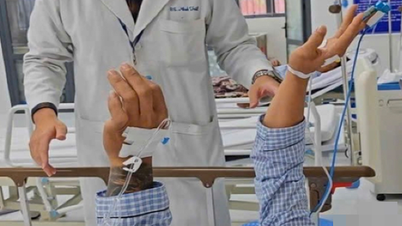Doctor Le Nhat Duy, University of Medicine and Pharmacy Hospital, Ho Chi Minh City - Branch 3 said, cerebral anemia is a condition in which blood flow to the brain is not enough to provide oxygen and nutrients for brain cells to function.
This is a common health problem in the elderly and people with many underlying diseases, but is now showing a tendency to become younger - especially in those who work at high intensity, are sedentary and are often stressed.
Signs of transient cerebral ischemia are easily ignored but very dangerous - PHOTO: AI
Early signs of stroke
Ms. NGN (23 years old, living in Phu Nhuan, Ho Chi Minh City) shared: “I was diagnosed with cerebral anemia when I was in middle school. This condition lasted for many years, and although I rarely go for check-ups now, I think it is still there. I often feel dizzy, whether standing, sitting, or lying down. Sometimes my vision blurred and I almost fell while sitting on a chair or driving because it happened suddenly.”
It is known that Ms. N. does not use any medication but only uses some functional foods for the brain.
According to Dr. Nhat Duy, transient ischemic attack (TIA) occurs in a short period of time and is therefore easily overlooked due to subjectivity. This condition occurs when a blood vessel in the brain is briefly blocked - usually by a blood clot. This blockage can quickly clear up on its own before causing long-term damage to the brain, so the symptoms only appear briefly and then disappear completely.
“Some studies show that patients with transient ischemic attacks are an early sign that occurs before 12% of stroke cases. According to statistics, about 12% of stroke cases (who have had a transient ischemic attack before) die within 1 year. About 9-17% of patients with a transient ischemic attack have a stroke within 90 days,” said Dr. Nhat Duy.
Symptoms to watch out for
From there, to raise people's awareness of disease prevention, doctors point out the symptoms of cerebral anemia:
- Dull or intermittent headache, especially in the forehead or back of the neck.
- Dizziness, vertigo, feeling lightheaded, loss of balance.
- Fatigue, difficulty concentrating, short-term memory loss, drowsiness.
- Sleep disorders such as difficulty falling asleep, light sleep, or waking up in the middle of the night.
Additionally, symptoms of transient ischemic attack (TIA) include:
- Loss of body sensation (sudden weakness, paralysis, or numbness): On one or both sides.
- Sudden speech disorder: Difficulty speaking, slurred speech, unclear words.
- Sudden visual disturbances: Blurred vision, double vision, or loss of vision in one or both eyes.
These symptoms can be fleeting and easily mistaken for common problems, but if they appear repeatedly, you should see a doctor early for timely diagnosis and treatment.
Cerebral anemia can lead to decreased concentration and poor memory - Photo: AI
How dangerous is prolonged cerebral anemia?
Cerebral anemia not only causes discomfort and reduces quality of life, but also leaves serious consequences if left untreated:
Increased risk of stroke: A study in the Netherlands showed that, during the period 1998-2018, about 6% of stroke patients were in the 15-49 age group.
Premature brain aging: Brain cells that are deprived of oxygen and nutrients for a long time can be damaged and age faster, increasing the risk of neurodegenerative diseases, migraines, anxiety disorders, and depression.
Effects on study and work: Reduced ability to concentrate, poor memory, slow thinking, easy fatigue, constant headaches.
Decreased quality of life: Symptoms such as dizziness, vertigo, tinnitus, and insomnia can be uncomfortable and affect daily activities.
Particularly for the elderly, cerebral ischemia can cause stroke: This is the most dangerous acute complication. When cerebral ischemia is sudden and severe, brain cells will be damaged, causing severe sequelae such as hemiplegia, loss of language, impaired consciousness, and even death.
Vascular dementia: Loss of memory, reasoning, orientation… seriously affects daily life.
Vascular Parkinsonism: Cerebral ischemia can affect areas of the brain that control movement, causing symptoms similar to Parkinson's disease such as tremors, stiffness, and difficulty walking.
Increased risk of falls: Dizziness and loss of balance due to cerebral ischemia increase the risk of falls, which is especially dangerous in the elderly because it can easily cause bone fractures and other injuries.
Exacerbating underlying medical conditions: Cerebral ischemia can make medical conditions such as diabetes, high blood pressure, and cardiovascular disease more difficult to control, creating a vicious cycle that affects overall health.
Source: https://thanhnien.vn/bac-si-dau-hieu-cho-thay-ban-dang-thieu-mau-nao-185250617005033292.htm








![[Photo] "Ship graveyard" on Xuan Dai Bay](https://vphoto.vietnam.vn/thumb/1200x675/vietnam/resource/IMAGE/2025/11/08/1762577162805_ndo_br_tb5-jpg.webp)

































![[Video] Hue Monuments reopen to welcome visitors](https://vphoto.vietnam.vn/thumb/402x226/vietnam/resource/IMAGE/2025/11/05/1762301089171_dung01-05-43-09still013-jpg.webp)




































































Comment (0)